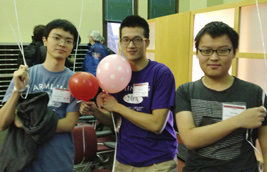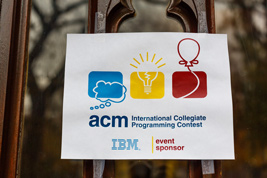Northwestern Computer Science Team Wins Programming Contest
Team ‘Wildcats’ will advance to competition finals in Russia in June 2014
A Northwestern University undergraduate team won first place in the Association for Computing Machinery (ACM) 2013 International Collegiate Programming Contest (ICPC) mid-central division, a competition that tests students’ algorithmic thinking and programming skills.
As winners of the regional contest, team “Wildcats” will advance to the 2014 ACM-ICPC World Finals, hosted at Ural Federal University Ekaterinburg in Russia from June 22 to 26, 2014. Sponsored by IBM, the event will bring together 80 top teams from around the world — roughly 1 percent of the 300,000-plus students who started in the ICPC’s local-level competition.
 The November 2 regional contest brought together 139 teams from five states to compete at the University of Chicago.
The November 2 regional contest brought together 139 teams from five states to compete at the University of Chicago.
The contest pitted teams of three university students against complex, real-world problems with a five-hour deadline. Working on a single computer, teammates collaborated to rank the difficulty of problems, deduce the requirements, design test beds, and build software systems that solved the problems under the scrutiny of expert judges.
The teams were presented eight problems of varying difficulty, and were required to write and run programs in a programming language and produce a correct result within the time limit, usually between 1 and 60 seconds. (In one challenge, teams were tasked with writing a computer program that could determine the smallest possible sum of two numbers that together use all of the numerals 1, 2, 7, 8, and 9 — for example, 78+129.)
Team Wildcats — comprising students Ed Kim, Zeyu Wang, and Siyuan Cai — was the only team to solve all eight problems.
The team had practiced together since March and took part in mock competitions with the University of Chicago’s team, which took second place. After strong results in those trials, the Wildcats went into the contest confident they would place near the top.
 “There were certainly mistakes that we made, but we managed to fix them. Any programmer should be prepared for bugs,” Cai said. “But when we found out we won, that moment was an immense relief.”
“There were certainly mistakes that we made, but we managed to fix them. Any programmer should be prepared for bugs,” Cai said. “But when we found out we won, that moment was an immense relief.”
Succeeding requires more than writing accurate code, said Peter Dinda, professor of electrical engineering and computer science at Northwestern’s McCormick School of Engineering and Applied Science.
“The obvious solution is unlikely to meet the time requirements, meaning the program probably wouldn’t run fast enough,” said Dinda, the team’s faculty adviser. “The team needs to see a less obvious solution that lowers the computational complexity.”
Another Northwestern team, “Ashe,” with members Chunxiao Diao, Yifei Yang, and Aiqi Xie, placed 12th regionally, placing in the top 10 percent of competitors.
A previous incarnation of the Wildcats won the regional competitions of 2006 and 2007, going to Tokyo, Japan and Banff, Canada for their world competitions. These alumni are currently at Microsoft, Facebook, and other top companies.